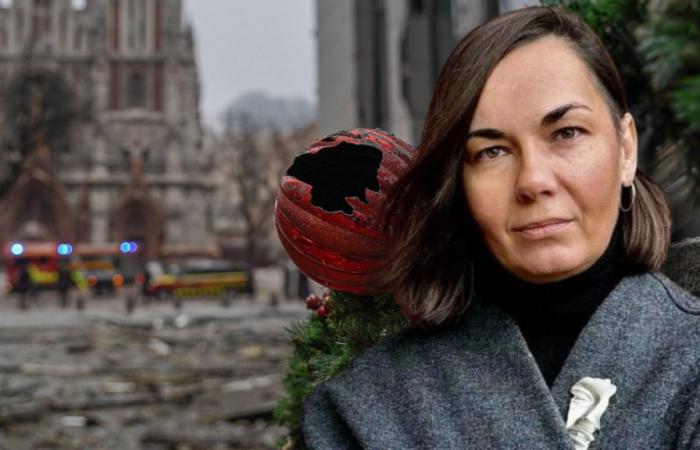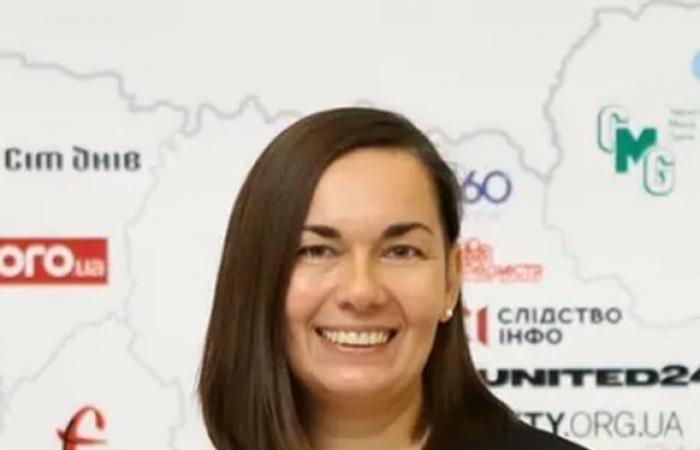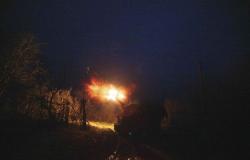Putin and his minions do not take into account the Ukrainian Christmas festivities, quite the contrary.Image: keystone
Oksana Brovko fled kyiv because of the war and settled in the west of the country. She does not want to leave Ukraine under any circumstances. In an interview, she recounts the personal dilemma of many journalists and how seven missiles crashed not far from her.
27.12.2024, 05:2827.12.2024, 07:42
Natasha Hähni / ch media
More from “International”
It’s Christmas time and for many people that means buying presents and celebrating with family. How is this period looking for you?
Oksana Brovko: Many traditions remained the same, even during the war. We still eat and sing as a family at Christmas, which is nice. But we also remember those we lost during the war. In addition, Christmas shopping may have to be interrupted because a missile alarm goes off.
“The question of security continues to dominate daily life”
You left kyiv at the start of the war to settle in western Ukraine, in Lviv. How much do you feel about the war here?
The situation is still very dangerous. The Russians are attacking important infrastructure across the country. At a friend’s house, not far from here, a power plant has just been hit. She hasn’t had electricity for two weeks. Near my house there are gas storage facilities. They are attacked from time to time.
“The other day I was at the train station and I saw seven missiles falling just two kilometers from me”
I was like frozen. Anyway, I didn’t have time to run to a bunker. Of course, the situation is significantly more difficult closer to the front, but unfortunately there is no truly safe place in Ukraine at the moment.
Oksana Brovko provides training to local editorial staff in Ukraine.Image: AZ/zvg
How do you respond to a missile alert?
When my youngest children (6, 8 and 9 years old) are home, I have to dress them. This alone takes time – especially in winter. If they are at school, my husband or I have to go pick them up. With the emergency bags – which contain our documents, our medicines, our chargers, our keys, water and snacks – we then go to the bunker. This is located at our house, in the underground car park. We stay there until the alert is lifted.
“During the missile alert, you must also not use the elevator in the building. So we have to walk down eight floors. It’s painful”
And the alarms sound often. Sometimes we are just too tired. It’s terrible, but sometimes I feel like I don’t have enough energy. For families with many children or young children, the effort is enormous each time.
Have your children already gotten used to war?
They still don’t understand why people kill other people. My youngest son asks me almost every night why this happens. I still don’t have an answer. I don’t understand it myself. So many of us have family in Russia. My children have become very patriotic. They have a completely different life than I had at their age. It makes me sad that they can’t enjoy their childhood like me. When he grows up, my six-year-old son wants to rebuild houses that have been destroyed. Like her grandmother’s. My 8 year old son wants to become a soldier.
“I would like them to dream of cars or football”
Yesterday, my six-year-old son told me he wanted to go home, near the forest. Where we lived before the war. This is painful to hear, because I cannot grant this wish.
In your role as head of regional independent journalists, you work with journalists from across Ukraine. Some of them are close or on the front. What do you hear from them?
More than 90 Ukrainian journalists have already been killed during the war. Others were kidnapped by Russians. Many local newsrooms have had to close their doors for security reasons. In most cases, however, they continue their work from other locations. But one of the biggest changes everywhere is that most men have disappeared from newsrooms. They went to the front. Of course, they take significant risks, but their absence also impacts those who are still working.
“Many experience burnout, they work almost 24 hours a day”
In the event of a rocket attack, every journalist faces the same dilemma: Do I cover the event or do I go see my family? How to decide? Two days ago, several impacts took place in my hometown of Zaporizhzhia. About two dozen people lost their lives. Of course, someone had to talk about it.
“Journalists, however, never know when and where the next missile would land”
I am lucky that my husband is not at the front and works at home. So in most cases I can work and he picks the kids up from school. My eldest son (22 years old) also helps out.
How did the work of journalists change during the war?
In the past, the most important question a journalist had to ask was always: Is the information important to the local population? Today, this question is followed by two others: can information be dangerous for the population? And what influence could the news have on the Ukrainian army? This is how we sort through certain stories.
Can you give an example?
If a rocket hits a residential building located near a military building, it means that the missile probably missed its target. If we talk about it right away, the Russians might see our article – and launch a second missile, which would then hit the “right” building.
It is precisely near the front and in the occupied regions that propaganda plays an important role. How do you manage it?
The favorite topic of the Russian propaganda machine is currently the mobilization of the Ukrainian army. There are many Telegram channels with false or exaggerated information on the subject. People would be killed just days after being drafted into the army, according to one of the stories. Their only objective is to make the Ukrainian population insecure.
“All we can do is report the truth and hope it reaches people”
This work requires a lot of effort. A recent search found that more than 2,000 Russian TikTok accounts were spreading misinformation on the topic.
How has the role of the media in Ukraine changed with the war?
At the start of the war, all our media coverage revolved around the war. This has since changed. People want to get back to “real life.” This is why, in addition to reporting from the front, many are talking about culture and social affairs again.
“Giving people back a little normality has become one of our main missions”
Themes that were not or much less important before also appeared. Since the war, many people have lived with physical and psychological disabilities. Reporting on disability-friendly infrastructure and topics like trauma management has become much more common.
“Almost all editorial offices now have a journalist specializing in funerals”
Coverage of dead people for our country is very important for the local population. But it is also one of the most demanding positions. Finally, stories of corruption pose a big challenge. Especially since the war, we have depended almost entirely on donations and subsidies.
What do you expect from the coming year?
The Russians took a lot of land from us this year. Without help from other countries, we will not be able to recover them. We of course hope for the support of the United States and Europe. This year, like all the others since the start of the war, I met wonderful new friends from all over the world. People who support us from other countries ask us how we are doing. I feel like we are part of a bigger family. I would like to continue to cultivate these friendships.
(Translated and adapted by Chiara Lecca)







